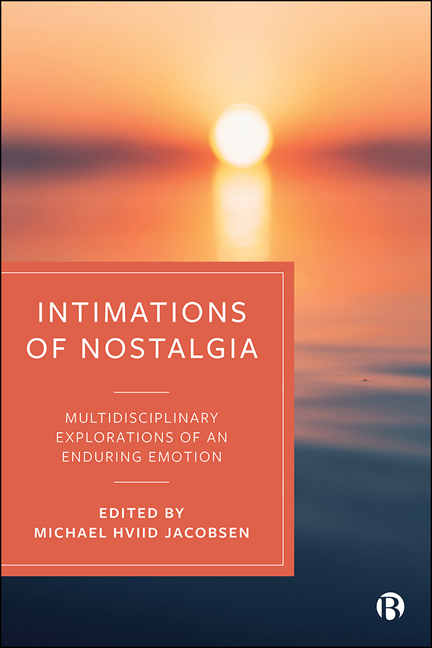Book contents
- Frontmatter
- Contents
- Notes on Contributors
- Preface and Acknowledgements
- Introduction: The Many Different Faces of Nostalgia – Exploring a Multifaceted and Multidisciplinary Emotion
- 1 Philosophy and Nostalgia: ‘Rooting’ within the Nostalgic Condition
- 2 History and Nostalgia: Historicizing a Multifaceted Emotion
- 3 Political Theory and Nostalgia: The Power of the Past in the History of Political Thought
- 4 Sociology and Nostalgia: Micro-, Meso-and Macro-level Dimensions of an Ambiguous Emotion
- 5 Psychology and Nostalgia: Towards a Functional Approach
- 6 Anthropology and Nostalgia: Between Hegemonic and Emancipatory Projections of the Past
- 7 Media Studies and Nostalgia: Media Philosophy and Nostalgizing in Times of Crisis
- 8 Marketing and Nostalgia: Unpacking the Past and Future of Marketing and Consumer Research on Nostalgia
- 9 Literature and Nostalgia: Vestiges of Paradise
- 10 Architecture and Nostalgia: The End of History, the End of the Future and the Prospect of Nostalgia
- Postscript: On Nostalgia of the Future and the Future of Nostalgia – Some Scattered Concluding Observations
- Index
7 - Media Studies and Nostalgia: Media Philosophy and Nostalgizing in Times of Crisis
Published online by Cambridge University Press: 13 May 2022
- Frontmatter
- Contents
- Notes on Contributors
- Preface and Acknowledgements
- Introduction: The Many Different Faces of Nostalgia – Exploring a Multifaceted and Multidisciplinary Emotion
- 1 Philosophy and Nostalgia: ‘Rooting’ within the Nostalgic Condition
- 2 History and Nostalgia: Historicizing a Multifaceted Emotion
- 3 Political Theory and Nostalgia: The Power of the Past in the History of Political Thought
- 4 Sociology and Nostalgia: Micro-, Meso-and Macro-level Dimensions of an Ambiguous Emotion
- 5 Psychology and Nostalgia: Towards a Functional Approach
- 6 Anthropology and Nostalgia: Between Hegemonic and Emancipatory Projections of the Past
- 7 Media Studies and Nostalgia: Media Philosophy and Nostalgizing in Times of Crisis
- 8 Marketing and Nostalgia: Unpacking the Past and Future of Marketing and Consumer Research on Nostalgia
- 9 Literature and Nostalgia: Vestiges of Paradise
- 10 Architecture and Nostalgia: The End of History, the End of the Future and the Prospect of Nostalgia
- Postscript: On Nostalgia of the Future and the Future of Nostalgia – Some Scattered Concluding Observations
- Index
Summary
Introduction
As most of us experienced, 2020 was a challenging year for the vast majority of people and countries around the world due to the consequences of the coronavirus pandemic. For a scholar in the humanities, it is difficult to omit current events from critical reflections, but it is also not adequate nor possible to analyse the present situation without the necessary historical distance. Nevertheless, one of the sentiments that has been expressed, narrated, experienced and performed via social media networks, media companies and ‘traditional’ news media alike during this crisis is – somehow unsurprisingly – one of nostalgia. For quite some time, scholars such as Svetlana Boym (2001) have pointed out that feelings of nostalgia emerge as protective reactions to crises and to so-called progress – both inevitable historical companions to most of our societies and systems (Hartog 2015). Being obliged to stay at home and/or to maintain distance from others has triggered great loss: people – some of whom are close to us – dying; limited or no physical relations with other individuals; restricted freedom to walk and to be in public spaces; losing jobs and so on. For some, the lockdown has also led to an awareness of the necessity to decelerate and slow down the current accelerated rhythm of life and to fight against, more than ever, social inequalities and dysfunctional healthcare systems. The role of journalists and news media during a crisis is, and has always been, crucial when it comes to sharing public health and political information. As forms of social media networks, they also assure a sort of presence and symbolic connection between their readers and viewers. It is therefore no surprise that informational and fictional media consumption has received a tremendous amount of hype during this crisis (Lee and Koblin 2020) in order for us to stay in touch with the ‘outside’ world from within the confines of our walls. Likewise, ‘nostalgic’ leisure activities (playing board games, watching television shows and so on) have occupied the ‘free’ time of those privileged enough to have any, as a means by which to distract themselves, calm their anxiety (Gammon and Ramshaw 2020) or to cope with the uncertainty of the situation by ‘nostalgising’ (Niemeyer 2014; Sedikides et al 2015). At some point, nostalgia became viral.
- Type
- Chapter
- Information
- Intimations of NostalgiaMultidisciplinary Explorations of an Enduring Emotion, pp. 151 - 170Publisher: Bristol University PressPrint publication year: 2021



